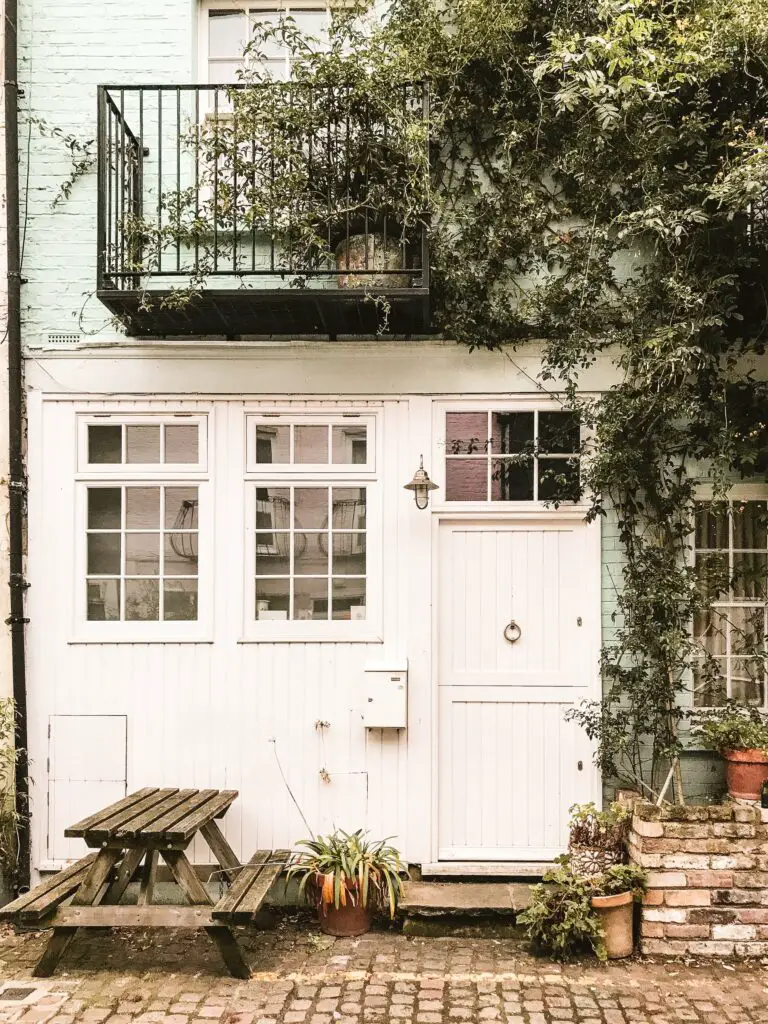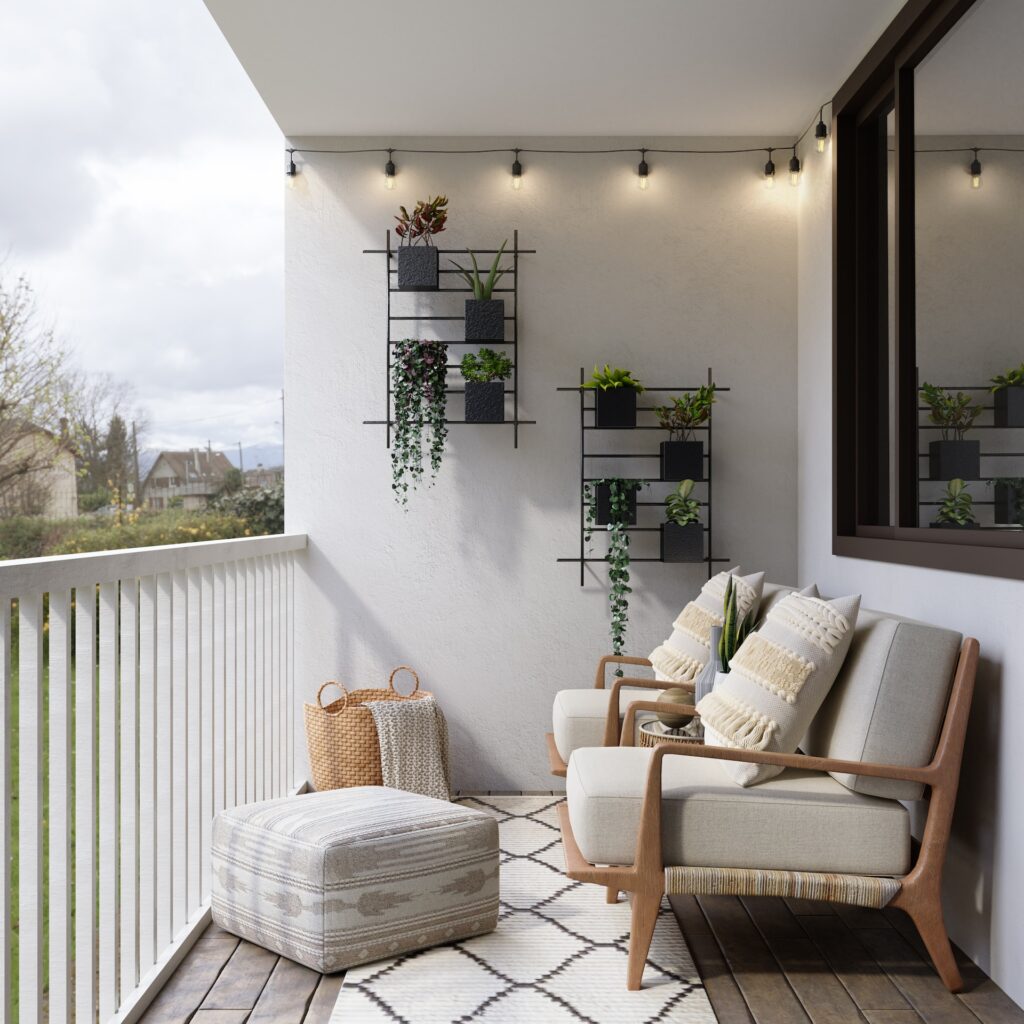Living in close proximity to neighbours is not always a pleasant experience, especially if your neighbour has undergone building work that has resulted in a loss of privacy. One common issue that many homeowners in the UK face is ‘My neighbour’s balcony is overlooking my garden, is there anything I can do?’
When dealing with a neighbour’s balcony overlooking your garden, take these steps: 1. Communicate openly and respectfully with your neighbour about your concerns. 2. Explore privacy enhancements like fencing, screens, or tall hedges. 3. Understand UK laws regarding privacy, nuisance, and planning permission. 4. Report potential violations to local authorities. 5. Seek legal advice if necessary.
If your neighbour’s balcony is overlooking your garden then in this blog post, I will delve into the various aspects of this common problem and explore potential solutions you have.
Understanding the Problem
The impact of a neighbour’s balcony overlooking your garden can be significant, affecting both your privacy and the enjoyment of your outdoor space.
Your garden is a place where you seek solace, relaxation, and a connection with friends and family. However, when a balcony looms overhead, it can feel intrusive and invasive, diminishing your sense of privacy.
Privacy concerns arise because balconies provide an elevated vantage point that allows neighbours to peer into your garden, potentially compromising your personal space.
Whether it’s during family gatherings, quiet moments of reflection, or simply enjoying a cup of tea on your patio, the feeling of being constantly observed can be unnerving.
The issue is intensified if the balcony overlooks a hot tub or swimming pool.
Moreover, the loss of enjoyment of your outdoor space is a direct consequence of the feeling of being overlooked. Your garden should be a sanctuary where you can freely engage in activities, spend time with loved ones, or engage in hobbies without the constant awareness of prying eyes.
I have actually had this issue in one of my previous houses, so I know how you feel!
The presence of a neighbour’s balcony can detract from this sense of freedom and restrict your ability to fully embrace your outdoor area.
As a homeowner, it’s important to address these concerns and explore potential solutions that can restore your privacy and allow you to regain the enjoyment of your garden.
In the following sections, I will delve into legal considerations, communication strategies, privacy enhancements, and other avenues to help you navigate this common issue effectively.

Legal Considerations For ‘Neighbours Balcony Overlooking My Garden’
If your neighbour’s balcony is overlooking your garden you need to establish if planning permission was required and obtained, consider if the balcony creates a private nuisance or is in breach of covenants contained within the property deeds.
When dealing with neighbour disputes, it’s crucial to have a clear understanding of the legal framework in the UK.
There are several laws and regulations that come into play when addressing issues related to privacy, nuisance, and planning permission for balconies.
Familiarising yourself with these legal aspects will empower you to make informed decisions and take appropriate actions.
Here are some key points to consider if your neighbour’s balcony is overlooking your garden in the UK:
Privacy Laws and Nuisance:
- In the UK, individuals have a reasonable expectation of privacy within their own homes and gardens. This expectation extends to protection from actions that interfere with their enjoyment of their property.
- The law recognises the concept of nuisance, which refers to any activity or behaviour that substantially interferes with a person’s use or enjoyment of their property.
- If a neighbour’s balcony overlooks your garden and significantly compromises your privacy or causes a nuisance, you may have grounds to address the issue legally.
Planning Permission for Balconies:
- Before constructing a balcony, your neighbour may have required planning permission from the local council, depending on various factors such as the size, location, and impact on neighbouring properties.
- Planning permission is always required for balconies that protrude from the house (that you can walk and sit on), whereas generally Juliet balconies are covered by permitted development.
- It is essential to determine whether your neighbour obtained the necessary planning permission for their balcony.
- If they did not, it could be a breach of planning regulations, and you may have grounds to challenge the legality of the balcony.
Property Deeds and Local Regulations:
- Reviewing your property deeds is crucial in understanding the rights and restrictions associated with your property.
- Check if there are any specific clauses related to privacy or overlooking balconies in your property deeds.
- Additionally, familiarise yourself with local regulations, such as those imposed by local planning authorities, as they may have specific guidelines concerning balconies and privacy.
It is highly recommended to consult with a solicitor specialising in neighbour and planning disputes to assess your specific situation and explore the legal options available to you. They can provide expert guidance on how to navigate the legal landscape and advise you on the best course of action.
Remember, each case is unique, and the legal considerations may vary depending on the specific circumstances.
Therefore, it is essential to seek professional legal advice tailored to your situation.
By understanding the legal framework and your rights, you can approach the issue of a neighbour’s balcony overlooking your garden in a knowledgeable and informed manner.

Step 1 – Communication and Mediation
When facing the issue of a neighbour’s balcony overlooking your garden, open and respectful communication can often be the first step towards finding a mutually satisfactory resolution.
If your neighbours are at the planning stage and you don’t feel comfortable with the location of the balcony, you should express your concerns rather than simply objecting to the plans. As the balcony hasn’t been approved yet, you could negotiate with your neighbour as to the location or glass/material used.
If the balcony has already been constructed and you are not happy with the loss of privacy, you could talk to your neighbour and ask if they would consider putting a privacy film over the glass to obstruct the view into your garden, such as this from Amazon.
It might be that the neighbour will agree to put the film on the sides but not the glass at the front. It really is a matter of compromise and if your neighbour is even willing to communicate with you about the balcony.
You could offer to pay for the privacy film and I imagine most people would be more than happy to do this to regain some privacy.
However, it’s worth remembering that if your neighbour obtained the correct planning permission then they don’t have to discuss this with you or make any alterations.
Here are some key points to consider when initiating a conversation with your neighbour:
Significance of Open and Respectful Communication
- Open and respectful communication is crucial to resolving any dispute or concern.
- Approach the conversation with a positive mindset, focusing on finding a solution that works for both parties.
- By engaging in constructive dialogue, you can foster understanding and empathy, potentially leading to a resolution without the need for legal intervention.
Tips for Initiating a Conversation
- Choose an appropriate time and place to talk, ensuring privacy and minimising distractions.
- Be polite, calm, and non-confrontational while expressing your concerns.
- Clearly communicate the impact the balcony overlooking your garden has on your privacy and enjoyment of your outdoor space.
- Listen attentively to your neighbour’s perspective and be open to finding a compromise that addresses both parties’ needs.
- Consider providing potential solutions or alternatives that can help mitigate the issue, such as installing privacy screens or adjusting the balcony design.
Involving a Mediator or Third-Party
- If direct communication does not yield the desired outcome, or if there is a breakdown in communication, it may be beneficial to involve a mediator or third-party.
- A mediator can act as a neutral facilitator, helping to mediate the conversation and guide both parties towards a resolution.
Remember, the goal of communication and mediation is to find a resolution that satisfies both parties involved. Keep in mind that compromise may be necessary, and maintaining a positive relationship with your neighbour can contribute to an amicable living environment in the long run.
However, in some cases, despite your best efforts, communication and mediation may not lead to a satisfactory resolution.
If this is the case, it may be necessary to explore further options, such as seeking legal advice or involving local authorities.
Each situation is unique, and the appropriate course of action will depend on the specific circumstances and the willingness of all parties involved to find a resolution.

Step 2 – Privacy Enhancements for Your Garden
When dealing with a neighbour’s balcony overlooking your garden, there are practical solutions you can implement to enhance your privacy and regain a sense of seclusion.
Here are some options to consider but it really depends on the location of your neighbour’s balcony the following will help:
1 # Install High-Quality Fencing
Installing a sturdy and well-designed fence around your garden can provide an immediate boost to your privacy.
Choose fencing materials that offer both functionality and aesthetics, such as wooden panels, composite materials, or metal options.
Ensure the fence is tall enough to block the view from the neighbour’s balcony and consider adding features like trellises or decorative elements to enhance privacy further.
2 # Privacy Screens
Privacy screens are a versatile option that can be strategically placed to block the line of sight from the neighbour’s balcony.
There are various types of privacy screens available, including wooden or metal panels, fabric screens, or even living green walls.
Consider the size, design, and positioning of the privacy screens to ensure maximum coverage and effectiveness.
Privacy screens will be a good option if you want some privacy around a hot tub or seating area.
You could also consider buying a large sun parasol and using it to block your neighbour’s view.
3 # Planting Tall Hedges or Trees
Planting tall hedges or trees along the boundary of your garden can create a natural barrier and increase privacy.
Choose evergreen species that maintain their foliage throughout the year, providing year-round privacy.
Laurel is a good option as it has large full leaves.
It is essential to consider local planning regulations and obtain any necessary permissions before making changes to your garden. Some local authorities may have specific guidelines on the height and materials of fences or restrictions on tree planting. Ensure that any modifications you make comply with these regulations to avoid potential conflicts and legal issues.
I appreciate that installing these privacy screens doesn’t solve the problem but they may help you feel more relaxed in your garden, especially if you are waiting on the planning department to undertake their investigations.
Remember, privacy enhancements should not negatively impact your neighbour’s property or contravene any legal requirements.
Strive for a solution that maintains a reasonable balance between your privacy needs and the overall aesthetics of your garden and surrounding environment.
Before implementing any privacy enhancements, it may be beneficial to communicate your plans with your neighbour. Openly discussing your intentions and ensuring they understand that your actions are motivated by the need for privacy can help maintain a positive relationship and minimise misunderstandings.

Step 3 – Reporting the Overlooking Balcony to Local Authorities
When to Report to Local Authorities
If the issue with the neighbour’s balcony overlooking your garden involves potential planning permission violations, it is important to report the matter to the appropriate local authorities.
You should consider reporting if you have evidence or reasonable grounds to believe that your neighbour did not obtain the necessary planning permission for their balcony.
Take pictures and evidence of the balcony and when the building work started, as you will need to provide the local authority with this.
How to Report to Local Authorities
Contact your local council or planning department to report the issue.
Provide them with relevant details, including the address of the property in question, a description of the problem, and any supporting evidence or documentation you may have.
Follow the procedures outlined by the local authorities, as they may have specific guidelines for reporting planning permission violations.
Role of Local Authorities
Local authorities have the responsibility to enforce planning regulations and investigate potential violations.
They will assess the reported issue, conduct investigations if necessary, and take appropriate action based on their findings.
The local authorities may issue warnings, require modifications or removal of the balcony if it is found to be in breach of planning regulations.
These steps should be taken to find a fair and equitable solution to the problem of a neighbour’s balcony overlooking your garden while respecting legal rights and regulations.
You may also like 📖
Step 4 – Seeking Legal Advice if Neighbour’s Balcony is Overlooking Your Garden
When to Seek Legal Advice
It may be necessary to seek legal advice when communication efforts and the planning department have failed to resolve the issue.
If your neighbour refuses to address the problem or if there is a persistent violation of your privacy rights despite your efforts to resolve the matter, legal intervention may be warranted.
Additionally, if there are concerns regarding potential planning permission violations or disputes related to property rights, seeking legal advice becomes crucial.
Potential Remedies and Actions
When seeking legal advice, a solicitor specialising in neighbour disputes can assess the specifics of your situation and provide guidance on potential remedies and actions.
Remedies may include pursuing legal action, such as an injunction to stop the intrusive behaviour, or seeking compensation for damages caused by the violation of your privacy rights.
For example, maybe your neighbour intentionally stands on the balcony staring into your garden consistently with the intention of causing you distress. This would be harassment and anti-social behaviour. If you are dealing with an issue like this then you should keep a detailed log of events.
Your solicitor can help you understand the legal options available, guide you through the legal process, and advocate on your behalf.
Importance of Consulting a Solicitor
Consulting a solicitor who specialises in neighbour and planning disputes is essential to ensure you receive accurate and tailored advice.
A specialist solicitor will have in-depth knowledge of the relevant laws, regulations, and precedents in neighbour disputes.
They can provide informed guidance on the strength of your case, the potential outcomes, and the most appropriate legal strategies to pursue.

Dealing with Balcony Disputes: Case Studies
Examining real-life examples can provide valuable insights into how similar issues of a neighbour’s balcony overlooking a garden have been resolved.
Here are a few case studies highlighting different approaches and their outcomes:
Case Study 1: Communication and Compromise
Issue: A homeowner had a neighbour who installed a balcony that overlooked their garden, causing a loss of privacy.
Approach: The homeowners initiated a conversation with their neighbours, expressing their concerns about privacy and the impact on their enjoyment of the garden. They proposed installing a privacy film on the glass to reduce the overlooking.
Outcome: Through open communication and a willingness to find a compromise, the neighbours agreed to the installation of the privacy film on the glass. This solution respected both parties’ needs, restored privacy, and maintained a positive relationship.
Case Study 2: Legal Intervention
Issue: A homeowner had a neighbour who constructed a balcony without obtaining the necessary planning permission. The balcony significantly intruded upon their privacy and enjoyment of their garden. The neighbour also has parties on the balcony and the neighbours purposely stare into the homeowner’s garden and shout abuse.
Approach: The affected homeowner sought legal advice from a solicitor specialising in planning disputes and harassment claims. The solicitor helped them understand their rights and potential legal remedies.
Outcome: The homeowner, with the guidance of their solicitor, submitted a legal claim against their neighbour for the planning permission violation and the impact on their privacy. They also applied for an injunction to stop the verbal abuse. The court ruled in their favour, and the neighbour was required to modify or remove the balcony, restoring privacy and rectifying the planning permission breach.
Case Study 3: Involvement of Local Authorities
Issue: A homeowner discovered that their neighbour’s balcony overlooked their garden, compromising their privacy. They suspected that the balcony had been constructed without the necessary planning permission.
Approach: The affected homeowner reported the issue to their local council’s planning department, providing evidence of the balcony’s construction and its impact on their privacy.
Outcome: The local authorities conducted an investigation and confirmed that the balcony had been built without proper planning permission. They issued an enforcement notice requiring the neighbour to either obtain retrospective planning permission or remove the balcony. The homeowner’s privacy was restored, and compliance with planning regulations was ensured.
These case studies demonstrate that different approaches can lead to successful resolutions, depending on the specific circumstances and the willingness of both parties to cooperate.
While mediation and compromise may be suitable for some situations, legal intervention or involving local authorities may be necessary in more complex cases.
It is essential to evaluate your individual situation and seek appropriate advice to determine the best course of action.

FAQs About Neighbour’s Balcony Overlooking Your Garden
Neighbour using flat roof as balcony, is it legal?
In the UK, using a flat roof as a balcony without the necessary planning permission is generally not legal. Converting a flat roof into a balcony typically requires obtaining planning permission from the local council.
It is important to check with the local planning department to confirm if your neighbour has obtained the appropriate permission.
If the neighbour is using the flat roof as a balcony without planning permission, it may be considered a breach of planning regulations. In such cases, you can report the issue to the local council’s planning department, which can investigate and take appropriate action.
However, it is worth noting that every situation is unique, and there may be certain exceptions or specific circumstances that could affect the legality of the balcony.
It is recommended to consult with a solicitor or planning consultant who specialises in property law to obtain specific advice based on your situation. They can guide on the legality of your neighbour’s use of the flat roof as a balcony and the appropriate steps to address the issue.
Balcony rules and regulations in the UK?
In the UK, the rules for balconies are governed by various regulations and considerations.
Here are some key points to be aware of:
- Planning Permission: The construction of a balcony may require planning permission, depending on factors such as the size, location, and impact on neighbouring properties. It is important to check with your local council’s planning department to determine if planning permission is required before proceeding with the installation.
- Building Regulations: Balconies must comply with building regulations to ensure safety and structural integrity. These regulations cover aspects such as load-bearing capacity, railing heights, and barrier design to prevent falls.
- Party Wall Act: If your balcony is attached to or affects a shared wall with a neighbouring property, the Party Wall Act may come into play. This legislation regulates the rights and responsibilities of property owners when undertaking works that could potentially impact shared structures.
- Right to Light: Balconies that could obstruct the natural light entering neighbouring properties may infringe upon the right to light. Neighbours have a legal right to receive a certain level of natural light, and any obstruction caused by a balcony may lead to disputes.
- Leasehold Agreements: If you live in a leasehold property, check your lease agreement for any specific restrictions or requirements regarding the construction or alteration of balconies. Leasehold agreements may have additional rules that need to be followed.
It is important to consult with professionals such as architects, solicitors, or planning consultants to ensure compliance with all relevant rules and regulations before installing a balcony.
This will help avoid potential legal issues and ensure that the balcony is designed and constructed in accordance with the appropriate standards and requirements.
What constitutes overlooking in planning?
In planning, “overlooking” refers to a situation where a development, such as a balcony, window, or elevated structure, provides direct views into neighbouring properties, compromising their privacy.
The concept considers the potential for visual intrusion and loss of privacy caused by the ability to see into habitable rooms, gardens, or other private areas of a neighbouring property.
Factors such as the distance between the overlooking element and the affected property, the height of the structure, and the angle of the view are taken into account when determining whether a development constitutes overlooking.
Planning authorities consider the impact on privacy and the reasonable expectations of privacy for residents in making decisions regarding overlooking in planning applications.
Do you always need planning permission for a balcony?
In the UK, the need for planning permission for a balcony depends on various factors, including the specific circumstances and regulations in your local area.
Here are some general considerations:
- Permitted Development Rights: In some cases, certain types of balconies may fall under permitted development rights. Permitted development allows homeowners to undertake certain types of small-scale improvements without the need for planning permission. However, there are specific limitations and conditions that must be met to qualify for permitted development rights. It is important to consult your local council’s planning department or review the permitted development guidelines to determine if your balcony falls within these rights. Juliet Balconies don’t usually need planning permission, as they fall under permitted development. Balconies that you can walk or sit on will need planning permission.
- Location and Impact: The need for planning permission can also be influenced by the location and impact of the balcony. If the balcony significantly affects the external appearance of the property, overlooks neighbouring properties, or impacts the privacy of others, it may require planning permission regardless of permitted development rights.
- Listed Buildings and Conservation Areas: If your property is a listed building or located within a conservation area, additional planning restrictions may apply. Balcony installations in such protected areas often require planning permission, even if they might otherwise fall under permitted development rights.
It is crucial to check with your local council’s planning department to determine the specific requirements and regulations in your area.
They can provide accurate guidance on whether planning permission is needed for your particular balcony project.
It is always recommended to seek professional advice from architects or planning consultants to ensure compliance with the relevant regulations and obtain the necessary permissions when required.
Final Thoughts About ‘Neighbours Balcony Overlooking My Garden’
In conclusion, I hope this blog has answered your questions about your query ‘My neighbour’s balcony is overlooking my garden, is there anything I can do?’.
Dealing with a neighbour’s balcony overlooking your garden can be a challenging situation, but there are steps you can take to address the issue.
Here are the key points to remember:
- Understanding the impact: A neighbour’s balcony overlooking your garden can raise privacy concerns and diminish your enjoyment of outdoor space.
- Legal considerations: Familiarise yourself with the legal framework in the UK, including privacy laws, nuisance regulations, and planning permission requirements for balconies. Consulting a solicitor specialising in neighbour disputes can provide invaluable guidance.
- Communication and mediation: Open and respectful communication with your neighbour is essential. Initiate a conversation to express your concerns, and consider involving a mediator if necessary to facilitate resolution.
- Enhancing privacy: Explore practical solutions to enhance privacy in your garden, such as installing high-quality fencing, privacy screens, or planting tall hedges. Ensure compliance with local planning regulations.
- Reporting to local authorities: If there are potential planning permission violations, report the issue to the local council or planning department. They have the authority to investigate and take appropriate action.
- Seeking legal advice: If communication and mediation fail or if there are planning permission concerns, seeking legal advice becomes crucial. A specialist solicitor can guide you through potential remedies and actions.
Additional Resources and Support – Neighbours Balcony Overlooking Garden
For further assistance with the query of ‘my neighbour’s balcony is overlooking my garden’, here are some resources that can provide additional information and support:
- Visit your local council’s website for information on planning regulations and reporting issues.
- Citizens Advice Bureau: The Citizens Advice Bureau offers free advice on various legal matters, including neighbour disputes.
- Law Society: The Law Society provides a directory of solicitors specialising in neighbour disputes.
- Civil Mediation: UK Mediation is an organisation that provides mediation services and resources for resolving disputes.
Remember, resolving a balcony overlooking issue requires careful consideration, effective communication, and an understanding of the legal framework.
Strive to maintain a positive relationship with your neighbours throughout the process, as maintaining good neighbourly relations can contribute to a nicer living environment.
By exploring the available options, seeking professional advice when needed, and utilising the resources and support available, you can work towards resolving the issue and reclaiming your privacy and enjoyment of your garden.





Leave a Reply